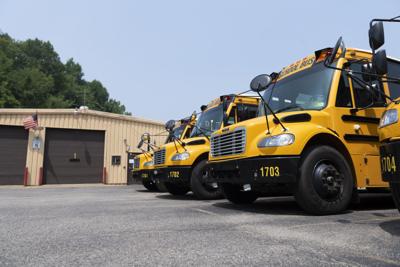This story was first published by WestVirginiaWatch.com and is republished here with permission.
CHARLESTON — As a special session of the West Virginia Legislature draws near, the head of an organization that represents school board members in the state expressed concerns Tuesday with legislation meant to address elementary school discipline.
Senate Bill 614 — a high-profile bill aimed at helping elementary teachers remove aggressive, violent or threatening students from their classrooms — died in the final hours of the regular legislative session, despite passing in both the House and Senate. The House failed to take action on the legislation — and other key education bills — as they hashed out the budget bill.
Senate president Craig Blair has said he wants to take up the bill during an upcoming special session meant to address lingering budget issues.
Jim Brown, executive director of the West Virginia School Board Association told members of the state school board Tuesday that while he normally refrains from speaking during state school board meetings, the “urgency of a current issue” prompted him to express his concerns regarding the bill.
Brown said the bill would establish a two-strike process for students, and will likely result in students being placed on homebound services because of a lack of alternative learning environments and their behavioral problems going unaddressed, he said.
“Having served as an elementary principal and a school district superintendent, I can attest this punitive approach fails to address the underlying issues and provide these students with the support they need to succeed,” Brown said. “If the truth be told, our elementary schools are ill-equipped to manage, let alone address the mental health issues our students are dealing with.”
The bill would have bolstered elementary teachers’ power to remove disruptive students from their classrooms. Removed students could be sent to a behavioral intervention program, which are available in only 13 of the state’s 55 counties.
If the county doesn’t have a program or enough staff to serve the child, the student would be suspended for one to three school days. Parents would be notified, the student would be prohibited from riding the bus and law enforcement may be notified if the student wasn’t picked up by the end of day.
A recent survey of public school teachers showed worsening student behavior was a top concern.
A small percentage of school districts in the state have an established alternative learning environment for elementary students, he said. In order to “attack the behavior” of students, Brown said, officials should acknowledge the reality of mental health challenges students face.
Brown urged the creation of a task force made up of teachers, parents, mental health providers, community leaders to develop policies to address mental health problems.
“It is imperative we conduct an honest review of the supports available across our state, from urban communities to the most rural settings that effectively address this pressing issue,” Brown said. “We must further gather data on the prevalence rate of mental health issues among our youth and assess the severity of their crisis. Only then will we be able to systematically identify, provide and implement strategies aligned with the challenges our students are facing.”
David Gladkosky, executive director of the West Virginia Professional Educators, said the word that describes the legislative session is “disappointment.” He expressed support for Senate and House leadership working on the school discipline bill.
“There [were] attempts, and I do say kudos to the Senate, chair of the Education Committee and the House chair of the House Education Committee for working on these and putting together good bills, but I’m just disappointed they didn’t come through,” he said.
House Democrats voted against the bill, citing concerns about the shortage of school-based mental health services and that kids could be unfairly forced to learn from home. The legislation did not come with funding.
Gov. Jim Justice will ultimately decide what bills lawmakers will take up during the session. Justice has not yet announced the dates of the session or what bills will be addressed.
Mickey Blackwell, a representative of the West Virginia Principals Association, told members that to address mental health problems, every school needs a full-time principal, full-time vice principal and full-time counselor.
“If the Legislature wants to do something about problem children, children who have problems, children who have disciplinary issues, you’ve got to have somebody to work with those kids one-on-one, two-on-one, whatever it takes,” Blackwell said. “And if they put their money where their mouth is instead of punishing the administrators, we’d all be better off.”
Dale Lee, president of the West Virginia Education Association, called the session “aggravating, tiring, disappointing. Miserable.” He thanked the state school board and Superintendent Michelle Blatt for continuing to talk about the need to address the mental and emotional needs of students and discipline of students.
“When I say discipline, I’m not talking about the violent child that needs to be removed, I’m talking about the disruptive child, the child who the night before saw a guardian overdose, is facing troubles that we can’t imagine,” Lee said. “I’m talking about the kid who sleeps in a car and goes from place to place never knowing where they’re going to have a meal, or a bed or anything else. And we wonder why that child is a disruption in class. It doesn’t take an expert to figure that out.”
Lee said officials need to address how to get parents and guardians of these children involved in the school and education process.

















Commented
Sorry, there are no recent results for popular commented articles.